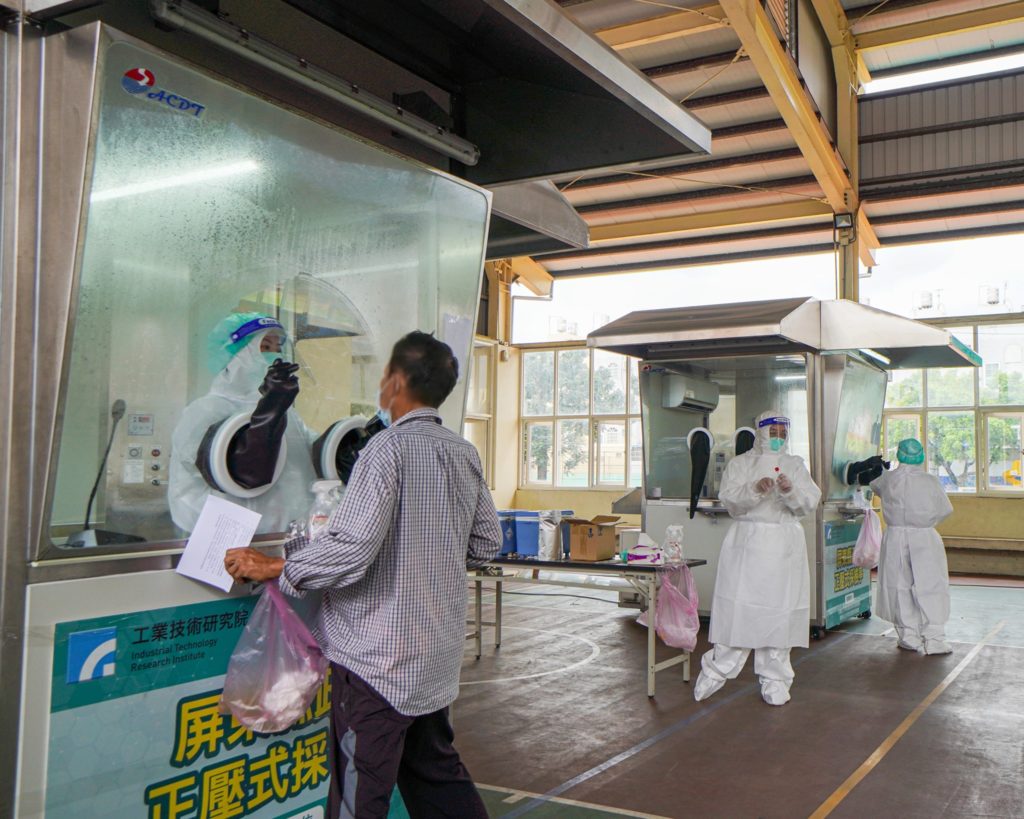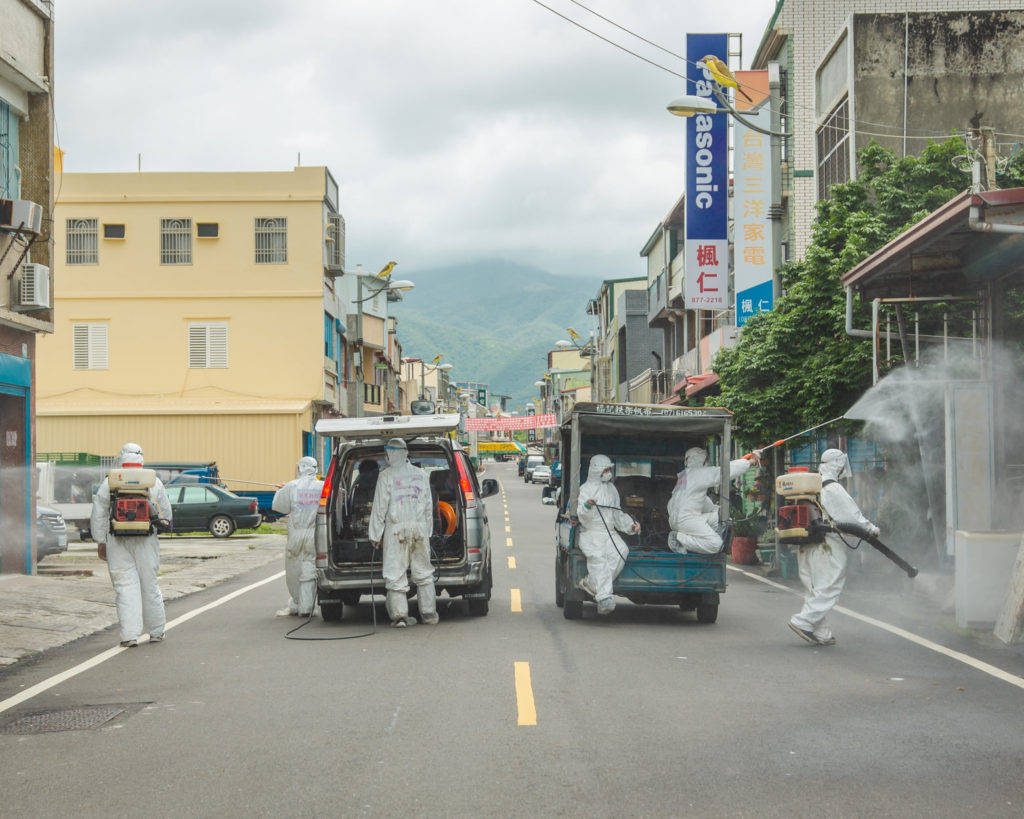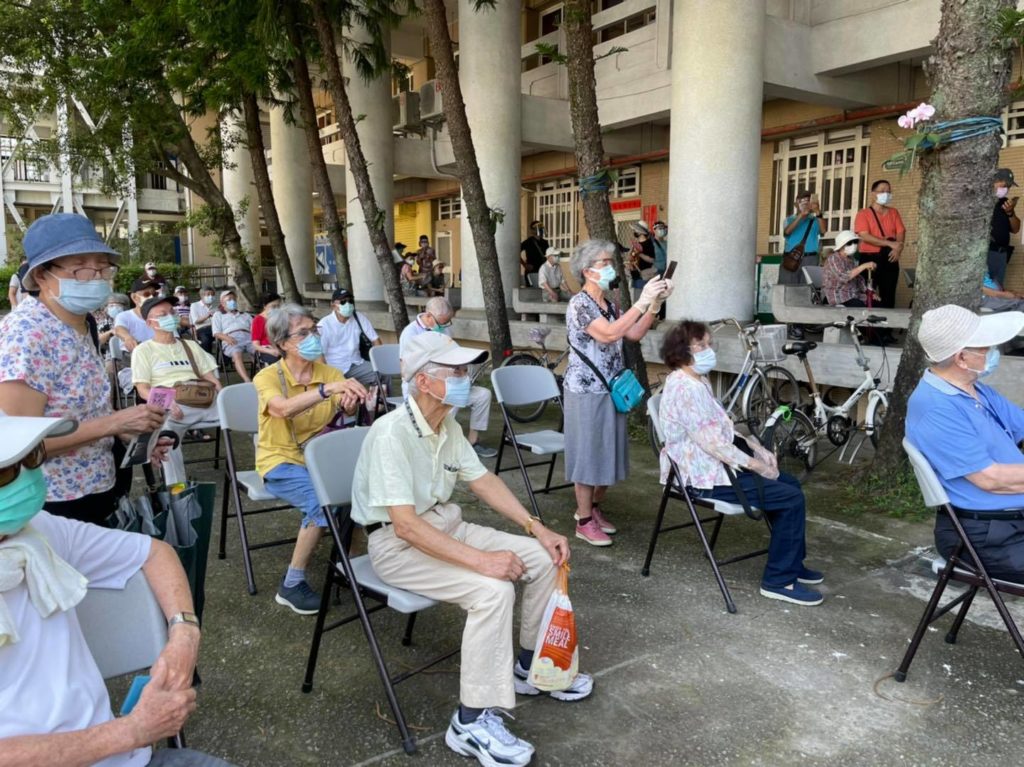by Brian Hioe
語言:
English
Photo Credit: Ko Wen-je/Facebook
VACCINE SKEPTICISM is on the rise in Taiwan, with visible decreases in the number of vaccinations in the past two weeks. On June 24th, the Central Epidemic Command Center (CECC), which coordinates Taiwan’s response to COVID-19, stated that vaccinations had declined to 50,000 per day, down from 150,000. Beforehand, Kaohsiung reported declines in vaccination from 8,000 to 3,000 over the three days at some testing sites.
At the current rate, Taiwan will have difficulty reaching its goal of one million vaccinations per week. Even at a rate of one million vaccinations per week, this will take 23 weeks to vaccinate the Taiwanese population with one dose, or at least fifteen weeks if Taiwan aims to vaccinate 2/3rds of its population. For two doses of vaccinations, this will take double the time. As such, it is not impossible that Taiwan could see recurring lockdowns for the next six months to a year, if the low rate of vaccination continues.
 Photo credit: Pan Meng-an/Facebook
Photo credit: Pan Meng-an/Facebook
The causes for this decline should be self-evident. Namely, the Taiwanese media has taken to reporting on deaths after vaccination of the AstraZeneca vaccine as though they were caused by the vaccine—this despite the lack of any proof suggesting that the deaths were caused by the vaccine. As a result, by the time the current outbreak ends, there will be more deaths than would have been necessary because of individuals afraid to be vaccinated—and many of these deaths will have been caused by the media.
The CECC has pointed out that Taiwan is rapidly approaching becoming a super-aged society. More than 200 people over 75 years old die per day. As this is the group that is primarily vaccinated right now, it should not be surprising that there is significant overlap. Autopsies have shown that those that died primarily passed away due to preexisting long-term conditions.
Yet the worst tendencies of Taiwanese media are on display with reporting on the deaths that have occurred after vaccination, including the poor fact-checking practices of Taiwanese media and the Taiwanese media’s tendency toward sensationalism. As such, news stories of any deaths after vaccination are reported on as though they were caused by vaccination. The most egregious story to date may be reporting on the sudden death of an infant after his mother was vaccinated in the Apple Daily on June 22nd, suggesting that the vaccine affected the infant through breast milk. Otherwise, one has seen articles in TVBS falsely claiming that the WHO intends to abandon the use of the AstraZeneca and Johnson and Johnson vaccines—something that is not true.
One has even seen headlines reporting on individuals that choked on zongzi after being vaccinated, or all manners of unrelated incidents which are still reported on as linked to vaccinations. One generally expects most members of the public to simply scan headlines, without reading the article, or even to simply partially read headlines. Even an article about choking to death on zongzi after being vaccinated still contributes to the media narrative of deaths after vaccination, seeing as what readers may remember is that the death took place after vaccination—not the part of the article about how the cause of death had little to do with vaccination.
To this extent, the daily CECC press conferences have proved an occasion in which uninformed speculation by the media is put on the national stage daily. Questionable claims from Taiwanese media on the national stage—drawing links between the sudden deaths and vaccination as though this were proven fact—lend such views legitimacy.
More generally, through the course of the outbreak, it has proved farcical to watch journalists from Taiwan’s major media outlets repetitively ask the same questions over and over again, demonstrating their lack of knowledge about medical science. Apart from continual questions about deaths after vaccination that have reinforced this narrative, one has seen repeated questions about testing. It should be basic knowledge by now that PCR tests that initially come back negative can later come back as positive, simply by virtue of the way that virus infections work, but sometimes one even hears journalists questioning the effectiveness of tests entirely due to this fact.
It should also be basic medical knowledge that someone who is vaccinated can still become infected with COVID-19 and still pass COVID-19 to others—anyone who has taken middle or high school biology should generally know this about vaccines. However, at CECC press briefings, one hears this brought up as though this disproves the effectiveness of vaccines altogether.
 Photo credit: Pan Meng-an/Facebook
Photo credit: Pan Meng-an/Facebook
It may be the case that journalists will next move toward platforming views that suggest all COVID-19 vaccines cause sudden deaths, as seen in questions at CECC press conferences that suggest that the Moderna vaccine also causes deaths. Similarly, journalists may begin to cast doubt on the effectiveness of currently available vaccines against the new variants of COVID-19, suggesting that the vaccines are useless against the new vaccines, and so that individuals might as well avoid the risk of sudden death by not being vaccinated.
More generally, journalist questions at CECC have failed to keep in mind that journalists have a responsibility to be careful about granting legitimacy to questionable ideas by platforming them.
And so it should not surprise either that journalists have generally failed to hold the CECC to account or clarify public knowledge about issues, as is the responsibility of the Fourth Estate when confronted with the government—any government, pan-Blue or pan-Green. Instead, they continually ask the same questions day after day, even when the situation has not changed and one receives the same answer as yesterday.
One can see this with endless questions about plans by Terry Gou to purchase vaccines, asking about a possible shift to level four, or, more recently, asking when level three will be lifted. Otherwise, questions are asked to try and catch CECC officials unaware, as a “Gotcha!” moment, rather than to clarify and make the public more informed.
This is not helped either by Taiwan’s hyper-partisan and “post-truth” political discourse. The KMT has embraced decidedly “post-truth” attacks on the Tsai administration on a number of fronts. For example, at a time in which Taiwan’s limited test capacity led to backlogs processing tests, this resulted in Taiwan’s limited testing capacity needing to be reserved for where it had the highest odds of detecting COVID-19 cases.
Regardless, the KMT called for general testing of the population as though extra capacity to conduct tests would materialize apropos of nothing, rather than that this would simply further clog up the testing system and make it even harder to detect COVID-19 cases. With such ideas unquestioned by the media, many members of the public followed, apparently thinking of the government as some kind of deus ex machina that could materialize unlimited capacity tests from the ether—whether from the KMT or the media, one rarely saw the CECC asked to elucidate the timeline for when testing capacity would be improved, but instead simply saw demands for mass testing to take place as though this were as easy as simply flipping a switch.
Much the same occurred with the KMT attacking the Tsai administration on the issue of vaccine acquisition. It is certainly true that Taiwan has experienced delays obtaining vaccines, despite sufficient orders having been placed by the Tsai administration. But a mere glance at vaccination rates across the world shows that many places in the world are lacking vaccines and that Taiwan is not particularly facing shortages. It is primarily First World, western countries that have been vaccinated, while the rest of the world has not. The KMT has instead sought to attack the Tsai administration as simply unwilling to obtain vaccines, again, hoping to leverage on how some members of the public seem to view the government as able to produce endless vaccines out of nowhere—if it were only willing to. But in truth, of course, the KMT would face similar issues regarding vaccine access if it were in power.
Apart from that the media has reported on post-truth, partisan attacks from KMT without interrogating them, one has also observed pan-Blue outlets seemingly working to introduce certain ideas into the political discourse. This can be seen with the CECC continually asked about the prospect of setting up “square hospitals” (方艙醫院) similar to those set up in China by pan-Blue media outlets. Not long afterward, Chinese state-run media began reporting on shortages of beds in Taiwan that have led Taiwan to imitate China in setting up square hospitals. With the Financial Times having reported in 2019 that pan-Blue outlets such as the China Times and CtiTV accept direct orders from China’s Taiwan Affairs Office in terms of what articles they run and their editorial direction, it would not be surprising if this continues during the COVID-19 pandemic.
Many issues return to Taiwan’s lack of credible information about the international world, then, something that Taiwanese media has not fulfilled its role in informing the Taiwanese public about. It has long been a paradox that, despite always seeking international recognition as a remedy to its marginalization, Taiwanese society has remained highly ignorant of the international world, or sees it through a highly distorted lens.
Governments around the world that began vaccinating the elderly—not just Taiwan—have experienced fears about sudden deaths by vaccines because deaths occur among the elderly population and this overlaps with elderly who are being vaccinated. Recently, in Malaysia, because of such fears, this led to a hashtag campaign to clear up fears about vaccines. There are other examples.
 Photo credit: Ko Wen-je/Facebook
Photo credit: Ko Wen-je/Facebook
And to reiterate, it is not only Taiwan that is facing issues with vaccine acquisitions. Yet the partisan nature of how vaccines have been used to attack the DPP is also evident in the framing of BioNTech. With Taiwan unable to obtain vaccines because of possible Chinese interference and shortages, despite that other vaccines should eventually arrive in Taiwan, BioNTech is framed as though it were the only effective vaccine—and somehow the only vaccine Taiwan cannot obtain. Yet lack of knowledge about developments in the international world is used to stir up fears in Taiwan.
More broadly, it is to be seen, then, whether fears about deaths after AstraZeneca vaccination will lead to greater public fears of vaccines, as well as whether the public will also begin to fear Moderna vaccines. Concerns about the safety of domestically-manufactured vaccines, too, will add to more general skepticism regarding vaccines.
This may be along the lines of what has been seen in the US and elsewhere, potentially contributing to the death toll similar to how COVID-19 raged on far longer than it needed to in the US because of widespread doubts regarding vaccines. As seen in the anti-vaccine movement in the US, conspiratorial views amplified by American media in the past decades has led to a widespread disbelief in vaccines, including views that vaccinations are a ploy by the government for mind control. It is to be hoped that Taiwan does not follow suit.
With pan-Blue and pan-Green media outlets alike leaning heavily into sensationalist reporting, it is to be seen whether this takes place. Much of this returns to how Taiwanese media is highly profit-focused, hoping to drive up hits and sell ads during a time of declining profit margins for media the world over. This takes first priority, even during a pandemic—many of the deeply-rooted issues of Taiwanese media return to the capitalist nature of the media sector.
Perhaps, then, what the current outbreak points to is the need for media reform in Taiwan. Instead of serving to hold the government accountable to the public or to keep the public informed, the Taiwanese media has proven irresponsible in its role during a time of crisis, prioritizing sensationalist reporting that will drive up hits and profits over responsible reporting that keeps the public updated—something that can, in fact, save lives. By contrast, because of its failure of responsibility, the media has become an active threat to the public. Blame for the deaths that occur because of people too afraid to be vaccinated—on the basis of entirely unfounded and unproven claims—can be laid squarely at the feet of the media.
To combat the wave of disinformation and misinformation, creative measures are needed. This may involve public campaigns or other civic efforts to change the narrative regarding vaccine safety. Certainly, Taiwan’s domestic media is not up to the task of being a steward of the truth.

